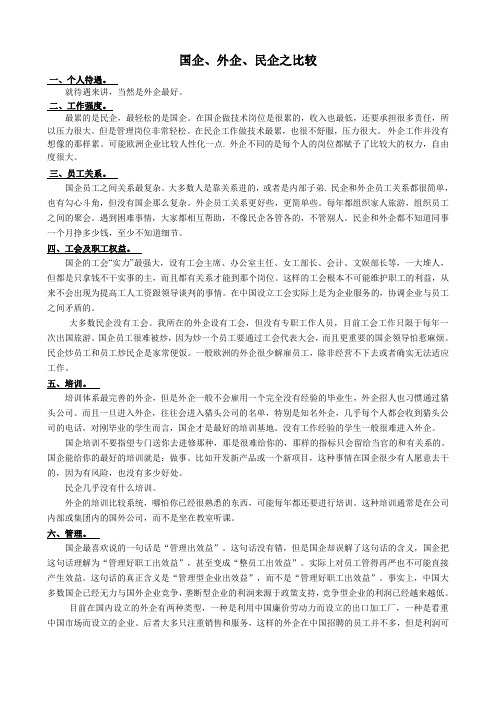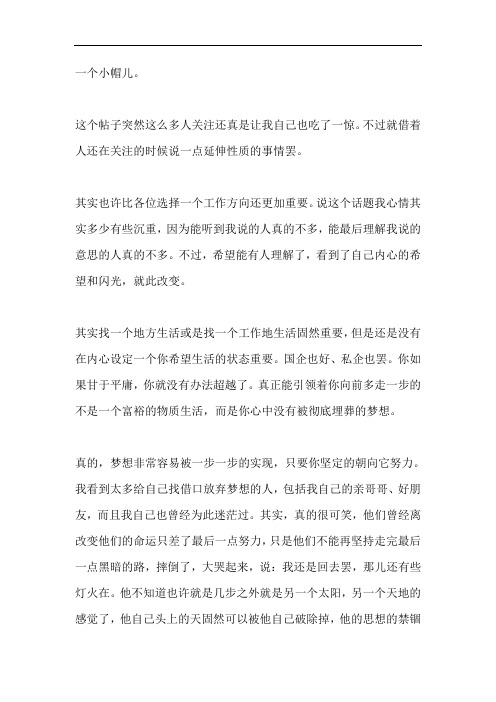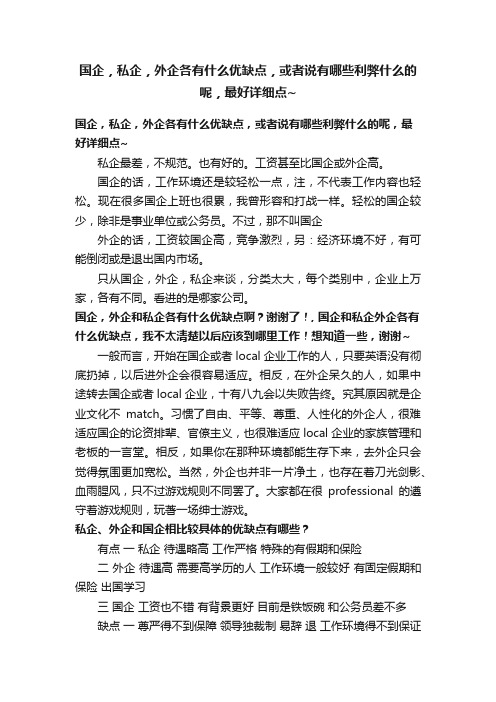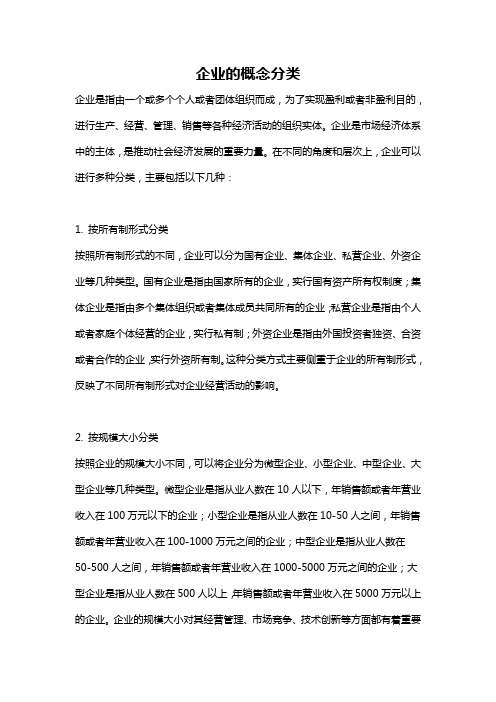国企,私企,外企的区别
国企、外企、私企的区别(Diff...

国企、外企、私企的区别(Differences between state owned enterprises, foreign enterprises and private enterprises)From the above table, we can see that the characteristics of different types of enterprises are very different. For example, the recruitment process of foreign enterprises is very complex and formal, while state-owned enterprises and private enterprises are relatively simple. The salary of foreign enterprise is high, the work intensity is big; the state-owned enterprise work is relatively relaxed, the salary is low, but the welfare is comparatively good.In the recruitment time, different enterprises have different preferences in the job, if fully aware of these factors, and the classification of different types of companies, can most effectively play to their strengths and avoid their weaknesses. For example, for different educational backgrounds, the government may attach great importance to the differences, and some foreign companies do not require academic qualifications. Enterprises, especially foreign companies, are really good places to exercise people, with rich salary and vast space for development. However, enterprises focus on performance rather than education, and in the face of passion and vitality of graduate students, graduate students may not have any competitive advantage, and even in the age has been at a disadvantage. Comparatively speaking, colleges and universities pay more attention to educational background, which has great advantages as a graduate student. Moreover, going to colleges and universities or the government itself is also profitable. The university has a strong academic atmosphere, suitable for study, for graduate students, from along-term perspective is conducive to effective continuation of their profession knowledge, and in accordance with the provisions of graduate students can apply for positive rating instructor, this starting point is relatively high; the government is a broad stage of practice, help to improve their own the practical ability of graduate students can enjoy the positive after deputy director at the start of the treatment, and the graduates opened the gap.Large companies, especially foreign enterprises, generally have a very systematic selection, education, reserve talent process, rather than temporary lack of people, grab a second days to go to work. However, for some special industry companies, like investment banking and management consulting, such as gold banks and McKinsey Co often because the business needs of the temporary recruitment of part-time and internship, so for these companies interested students should always pay attention to their website, understand the development direction, the company's business focus and information, and strive to obtain valuable the company's experience, ready for their day after entering the company or related industries, increase their competitiveness.In terms of heart, the recruitment advertisement of state-owned enterprises and private enterprises is not particularly standard. These two types of enterprise recruitment, the description of the job is generally relatively simple, the description of qualifications also stresses some rigid indicators, such as professional, English level. This requires you to increase the intensity of the investigation, from recruiters, the company's insiders and other channels tostrengthen the understanding of the enterprise and the job, to determine whether they want to identify as their own goals.And there are differences between big and small businesses. Large enterprises recruit graduates, mostly to train them as reserve talents; while small enterprises recruit graduates, it is hoped that he can immediately apply knowledge to their work. Therefore, the focus of different enterprises is different when recruiting people. This also has to be understood by job seekers.Special attention: state owned enterprises VS. foreign enterprisesA lot of graduates after graduation, often choose the sense between state-owned enterprises and foreign companies to hesitate. For example, what are the profitable domestic enterprises (such as telecommunications, securities, Datang, Lenovo), or foreign-funded enterprises?From the same industry face the revenue, domestic enterprises are usually inferior to foreign enterprises, "big"Name", foreign companies are more attractive. Therefore, foreign white-collar workers have been the pursuit of many elite students, but foreign companies are not without shortcomings, the income of state-owned enterprises may not be less. The advantages of foreign funded enterprises are: high wages, welfare treatment norms, free training opportunities, multinational companies may go directly to the headquarters of Foreign Affairs (such opportunities are not many, but stillpossible to seize).Salaries in foreign enterprises are divided into two grades:OneGeneral foreign companies, wages in 6k-10k. The general work of this kind of enterprise is not busy, sometimes known as a "capitalist mess", is a state-owned enterprises inside the lazy atmosphere, just take more than state-owned enterprises, dress neatly, more welfare, high quality staff. It is a good place to cultivate petty bourgeoisie sentiment. The disadvantage is that a long time, people will become lazy, every day should focus on how much underwriting fees should be paid this month, the salary rise this year, how many percent?TwoThe global system of treatment in some consulting and financial companies". That is, you take the American salary and enjoy China's consumption. But these enterprises are generally very busy, often work overtime, for the quality of personnel is also extremely valued, if you are incompetent, it is best to automatically leave, belongs to "up"Or out.State owned enterprises can be divided into three grades:1. traditional sunset industry: wages at 1k-3k, the advantage is Beijing hukou. Such enterprises are generally residentspringboard, graduates in which to get the residence, job hopping.TwoEmerging sunrise industry: wages in 3k-10k, you can see that some of these enterprises are not less than the first class of foreign companies, but the average level is not up. These enterprises can also solve the problem of household registration, some listed companies return shares (shares are not equity), so some people in the stock market more than wages.ThreeNational monopoly industry: invisible income. Telecom:year-end bonus bonus: many securities; many valuable news; newspaper: red; national ministries: relationship; TV: welfare; Bank: red; insurance: commission......Of course, if you do a good job in these enterprises, your income will exceed the first class of foreign enterprises, and even reach the level of second types of foreign enterprises.1.2 cultural differences between different types of foreign enterprises1. European and American corporate culture: people oriented, open democracyAmerican enterprise:Bill is a global sales engineer of Computer Corporation of America. His eyes are full of passion: "have you ever seen an office like this?" It is completely open, without intervals, each person's daily position is different, automatic allocation of tasks when the clock, all busy busy, phone calls, keyboard sounds intertwined. As soon as I walked into the office and saw the busy scene, I felt the blood boiling all over my body, and the energy inside me was going to spill over." Bill said, in the company, everyone regardless of the position of the name of the English name, feel very equal, very democratic, which is also a unique landscape of foreign companies it! On the creativity of employees and work efficiency is high, we work very hard all night, overtime is common." We are very well paid, but there are not many regular employees, many employees are hired in collaboration, the company's computer and telephone systems are outsourced, and the cost has been reduced a lot." Bill is most satisfied with the company's strong learning atmosphere. "If you ask for a raise, the company may be hesitant; if you want to study, the company will welcome it. From the day we entered the company, we began to accept the "devil" training, and even if the manager, there are still different training waiting for you. After grinding, each of us has a unique, healthy confidence that almost becomes the label on the face of the company, and in the crowd we can be identified accurately."German enterprise:Germany, which has many great philosophers, is endowed with a rigorous, calm and restrained character. German companies also have these characteristics?Angel is the Department Manager of SIEMENS mobile. She has been serving here for 4 years. "German corporate culture, just like SIEMENS's mobile phone, simple, generous", angel three sentence from the line, "the company gave employees a lot of freedom.". We don't have to punch in and out, and we get good pay,But the work pressure is very small. The manpower of German enterprises is always much looser than the actual needs. We never work overtime, and companies don't encourage overtime, because Germans are good at enjoying life, and they don't change their work into life." "German rigorous, meticulous world famous, our company also has the embodiment, that is our rules and regulations, refined to the unimaginable.". In the implementation of the system, the German company strict in demands unreasonable. The strange thing is, you're not bound by these systems, they just tell you exactly what processes are going on. As long as the process is done, no one will interfere with your specific operations, because the Germans pay more attention to the results." "Our training system is very perfect, as long as the competent level, you can be sent to Germany to learn, I have gone three or four times. The company also sent me to Europe to study MBA, more than ten thousand tuition fees, such a large amount of writing, I'm afraid only German companies will have." "But in terms of interpersonal relationships, we have completely localized, Chinese culture defeated the German culture. In Germany, if you don't like someone else, you can still do your job with a paycheck. In China, the relationship is closely related to the goal of work, and the relationship is always important."2. Hong Kong and Taiwan Corporate Culture: suffering from its mind, toil its muscles and bones1) Hong Kong funded enterprises:Small C finally fulfilled his wish to enter the Hutchison Whampoa company, although the young man with a foreign certificate is only responsible for some customer service work, but he still works enthusiastically. The professional spirit of Hongkong people is impeccable. They often call the word "professional integrity" on the lips, which is their precious personal brand. In Hongkong, people and things were very open, privately can be good friends, no one to do. I used to work in a family business in Hongkong, where the employees were relatives of the boss, but they didn't take the relationship to work, and they were punished for doing wrong. At the beginning, I was not accustomed to this way of working, but thought, this is a manifestation of their professionalism, I not only want to understand, but to learn from them, as soon as possible into the corporate culture to." "Everyone in Hongkong is a workaholic, this culture has made the company into a high speed operation of the machine, don't let it stop or slow down, I can do, is to rotate together, otherwise it will be crushed. Imagine working in a Hongkong company. The pressure is huge. My colleagues in Hongkong often stay awake for a few days, and work overtime every weekend." Although the Chinese people, but the two places in lifestyle, values, there are still great differences. When speaking language, communication is often impeded. Sometimes communication is really difficult, just use english. Think, two Chinese, but communicate inEnglish, this kind of thing, I'm afraid only Hongkong companies have it!2) Taiwan funded enterprises:Into this Taiwan funded electronic group, is against its reputation in the industry, and now proved the depth of water shallow water, Chiang Kai Shek cried in regret at the same time, the company still has confidence. "Taiwan company is very pragmatic, new employees must start from the grassroots.". As soon as I checked in, I was sent to the production line for half a year's exercise. It is normal to eat bitterness, but it is difficult for a company to keep its promise and pay no attention to its employees' feelings." "Our basic wage is not high, recruitment said 2000 yuan, but after it became 1500 yuan.". The promises made by the company were not fulfilled at all. After working so long, except for the first month of normal rest, the rest of the rest only one day a month, working 12 hours a day. We did a long time in the production line, the company has not moved us back to headquarters, a female colleague himself, to ask the Department Manager, the manager said: "we don't want the female department,You just stay on the production line. You can't stand it. Just leave it" "In the production line of the day is difficult, every day of our leaders often tell us shout and wrangle, like, but I decided to go on. When I was employed, the company left a good impression on me. Several Taiwanese managers were modest and courteous, which made me feel the civilized and humane side of Taiwan funded enterprises." Xiao Jiang said, when there were seniors reminded her, just entered the company, the conditionsmust be more difficult, but the company is strong in the line, otherwise the fame will not be so big. Here you can learn a lot of things, the key lies in a word - "endure", after a few years, personal ability will be greatly improved, salary will rise rapidly. If so, then make it, maybe this is the Taiwan funded enterprises in the enterprise culture, management norms, such as European and American enterprise system, everything is not too easy, but I believe that plum flower." Said Xiao Jiang with a smile.3. Japan and South Korea corporate culture: constraints personality, highlight the level1) Japanese funded enterprises:Japan, a resource poor country, in less than 30 years, at an alarming rate on the ruins of war suddenly rises, where is the secret? Jacky, a director of a heavy industry company in Japan, believes that corporate culture plays a big role in it. "Japanese companies have a strong cohesion," harmony "is the core of enterprise culture. At this point, it is influenced by Chinese Confucian culture. They are strict management, but in order to make employees more hard work, also try to get a business atmosphere. The lifelong employment system and the trade union are both the expression of human feelings. Employee's birthday, marriage, can receive the company's blessing. The welfare of Japanese enterprises is quite good. The bonus and allowance need not be mentioned. The company also builds swimming pools and gymnasiums, and conducts some activities of health consultation and psychological training irregularly." However, some practices of Japanese enterprisesalso make Jacky not used to it. "Japanese enterprises are a place that speaks only about groups, not personalities. You must obey, obey and obey here.". The Japanese feel that the market competition is the competition between teams and teams, and the employees must be uniform, so we seldom mention it even if we have opinions. In addition, the Japanese are all workaholic, in their eyes, work on time is a shameful thing, they almost every day in the game, who work late. As a result, when we finish the job, we don't dare to walk, and pretend to be a busy person. What's more, a lot of Japanese do not take overtime pay for working overtime. They think this is the right thing to do, and make us feel embarrassed." The efficiency of Japanese enterprises is relatively low. Because of the emphasis on absolute obedience, a proposal must be submitted to the examination and approval at various levels, which consumes time and energy, which is somewhat like the style of some state-owned enterprises."2) hanziqiye:Mr Lau is a Korean company, is a big role in the electronics industry Chinese. In such a company as middle-level cadres, he talked about corporate culture, but hung a few helpless face. The essence of Korean corporate culture is to make all employees highly aware of the enterprise, highly understand the strategic objectives of the enterprise, and highly conscious of the work done by the enterprise. In order to achieve this goal, everyone will receive two weeks of training new members every day, shouting love the company slogan, zipper, mountain climbing. Management is also very strict on weekdays, some employees do not wear clothes when eating, the result is either not eating,or accept a fine. In this environment, employees gradually agree with the subordinate obedience to the work habits of superiors." Liu said, according to regulations, they work 6 days a week, every day from 8 a.m. to 7:20 PM, before leaving work, but also to the superiors detailed report of the day's work. Fortunately, their training program is attractive, and many young technicians have the opportunity to train in korea. However, the promotion of Korean enterprises is quite difficult, and he can walk to the present day,Several times as much effort as ordinary people have done. "The hardship of work is nothing. The biggest problem is that the status of Koreans and Chinese is not equal enough.". Korean wages are many times the Chinese people, even in the canteen food, there are also obvious grades. The leading positions in the company are almost all occupied by Koreans, and the Chinese are no longer able to be promoted. I feel here has already peaked, how to take the next step, I'm at a loss."。
国有、民营、外资企业人才管理的差异

必须承认多数外企对人才的管理从理念到制度很健全,毕竟西方经过了工业革命以来百年的积淀。同时也要看到国有企业的学习能力非常强,这几年的发展也很快。我认为民营企业是中国经济中最有活力的群体,未来世界上的优秀的企业一定会出于其中。
在我过去十几年的从业经历中,外企、国企,民营企业都做过,感受各不相同,表面上看是制度、方法的不同,实际上是文化、价值观的差异。
我进入外企是在九十年代,当时外企把先进的管理理念带入中国,也帮助国内培养了一批职业化的管理人才。没有改革开放,没有外企带来的管理思想,也就没有现在中国经济的高速发展。进入国内的外企一般都处于市场化程度较高的行业,企业和人才是一种互相依存的关系。外企通常重视人的综合素质,即要有才又要有德,在道德层面有缺陷的人是不受欢迎的。年轻人进入外企,更象进入一所学校,外资企业有一整套的培训体系,比如入职培训、PDP、LDP等等。外企的培训投入一般都超过其工资总额的3%.当然培养出的人才是要用的,用人上能给与充分信任和授权的(这是在没有触犯其道德底线的前提下),会充分发挥人的潜能,甚至是超额的使用。当然外企也不都一样,甚至有的500强比不上现在的国内企业对人的尊重。
国有企业是最为复杂和特殊的,难以一两句就描述清楚,传统国企都带着体制的烙印。我刚进入国企的时候也是很多都看不懂,明明可以走直解决的事情,却偏偏要走一个弧线。终于有一天豁然开朗,太有必要了,甚至感叹发明这些办法的人太聪明。国有企业选人上也是要求德才兼备,但德更偏重于内敛与顺从。通常一个人才要想被重用,都要经历一个被磨练的过程。因为国企内部是一个封闭的群体,要首先获得这个群体的认同才能被重用。现在很多国企的职业化程度还是不够。对人才观念是老和尚念新经,想的还是要来那些事。
我接触的民营企业都是有外资风投,有几个老外当董事的公司人才理念还是先进的。当民营企业整体真正存在的时间也就二、三十年,甚至没有经历过一个完整的经济周期。很多都脱不了家族管理的阴影。很少有在人才管理上有健全的体系。民营企业要向高层次发展,需要时间的洗礼和文化的积淀。特别是企业家本人的视野的扩展。
国企、外企、民企之比较

国企、外企、民企之比较一、个人待遇。
就待遇来讲,当然是外企最好。
二、工作强度。
最累的是民企,最轻松的是国企。
在国企做技术岗位是很累的,收入也最低,还要承担很多责任,所以压力很大。
但是管理岗位非常轻松。
在民企工作做技术最累,也很不舒服,压力很大。
外企工作并没有想像的那样累。
可能欧洲企业比较人性化一点. 外企不同的是每个人的岗位都赋予了比较大的权力,自由度很大。
三、员工关系。
国企员工之间关系最复杂。
大多数人是靠关系进的,或者是内部子弟. 民企和外企员工关系都很简单,也有勾心斗角,但没有国企那么复杂。
外企员工关系更好些,更简单些。
每年都组织家人旅游,组织员工之间的聚会。
遇到困难事情,大家都相互帮助,不像民企各管各的,不管别人。
民企和外企都不知道同事一个月挣多少钱,至少不知道细节。
四、工会及职工权益。
国企的工会“实力”最强大,设有工会主席、办公室主任、女工部长、会计、文娱部长等,一大堆人,但都是只拿钱不干实事的主,而且都有关系才能到那个岗位。
这样的工会根本不可能维护职工的利益,从来不会出现为提高工人工资跟领导谈判的事情。
在中国设立工会实际上是为企业服务的,协调企业与员工之间矛盾的。
大多数民企没有工会。
我所在的外企设有工会,但没有专职工作人员,目前工会工作只限于每年一次出国旅游。
国企员工很难被炒,因为炒一个员工要通过工会代表大会,而且更重要的国企领导怕惹麻烦。
民企炒员工和员工炒民企是家常便饭。
一般欧洲的外企很少解雇员工,除非经营不下去或者确实无法适应工作。
五、培训。
培训体系最完善的外企,但是外企一般不会雇用一个完全没有经验的毕业生,外企招人也习惯通过猎头公司。
而且一旦进入外企,往往会进入猎头公司的名单,特别是知名外企,几乎每个人都会收到猎头公司的电话。
对刚毕业的学生而言,国企才是最好的培训基地。
没有工作经验的学生一般很难进入外企。
国企培训不要指望专门送你去进修那种,那是很难给你的,那样的指标只会留给当官的和有关系的。
国企、外企、私企比较

国企外企私企比较很多大学生和刚工作的职场新人很希望能去外企工作,因此,我决定写这样一个完整版的系统介绍的贴子,仔细分析企业之间的差异、外企之间的差异、以及怎样为进入自己喜欢的外企做必要的准备工作、并最终进入目标企业。
公司类型是按照公司的所有制形式及其导致的不同制度与文化来划分的,主要有国企、民企或私企这些不同的企业形式。
不同类型的公司在招聘的时候有很多不一样的地方,在工作氛围、员工福利等方面也有许多不同的做法。
根据已有的信息,也作了一些总结。
更加具体的情况,则仍然需要自己去搜集。
总结的情况如上表所示:从上表可以看出,不同类型的企业各方面的特点是很不一样的。
例如,外企的招聘流程非常复杂和正规,而国企和民企则相对较为简单。
外企的薪水高,工作强度大;国企工作相对轻松,薪水低,但福利非常优厚等。
在招聘的时候,不同企业和机构也有不同的偏好,如果在求职的时候能充分地注意到这些因素,并对不同类型的公司进行分类比较,就能最有效地发挥自己的优势,避免自己的劣势。
比如,对于本科生和研究生的不同学历来说,政府可能十分看重其中的差别,一些外企则并不要求学历的限制。
国企分类:一等国企:国有超大型垄断性企业或政策性银行。
如:中石油、中石化、中海油、国家电网、中国移动、中有色、中国五矿、国家开发银行、进出口银行…… 注:这些来说一般总部非常高,分公司或者子公司有一定差距。
应届生总部的待遇简直是理想级别的。
当然,大家的优势在于,超大型的总部一般都在北京。
其中国开行和中石化总部待遇应该是首屈一指。
二等国企:国资委下属的大型国有企业。
“中国”打头的都是这一类型:中纺、中化、中建、中钢、中远、中粮、中金、中国人寿…… 注:这些企业其实与上述“一等”并没有实质性差距,而是在应届生刚进公司时可能需要一定时间积累。
当然,待遇是准理想级。
三等国企:国资委下属或者其他委下属的其他大型国有企业、研究院、国有四接下来是外企分类:A类外企:欧美大型咨询,金融服务公司及投资银行。
过来人谈国企、私企、外企的区别

一个小帽儿。
这个帖子突然这么多人关注还真是让我自己也吃了一惊。
不过就借着人还在关注的时候说一点延伸性质的事情罢。
其实也许比各位选择一个工作方向还更加重要。
说这个话题我心情其实多少有些沉重,因为能听到我说的人真的不多,能最后理解我说的意思的人真的不多。
不过,希望能有人理解了,看到了自己内心的希望和闪光,就此改变。
其实找一个地方生活或是找一个工作地生活固然重要,但是还是没有在内心设定一个你希望生活的状态重要。
国企也好、私企也罢。
你如果甘于平庸,你就没有办法超越了。
真正能引领着你向前多走一步的不是一个富裕的物质生活,而是你心中没有被彻底埋葬的梦想。
真的,梦想非常容易被一步一步的实现,只要你坚定的朝向它努力。
我看到太多给自己找借口放弃梦想的人,包括我自己的亲哥哥、好朋友,而且我自己也曾经为此迷茫过。
其实,真的很可笑,他们曾经离改变他们的命运只差了最后一点努力,只是他们不能再坚持走完最后一点黑暗的路,摔倒了,大哭起来,说:我还是回去罢,那儿还有些灯火在。
他不知道也许就是几步之外就是另一个太阳,另一个天地的感觉了,他自己头上的天固然可以被他自己破除掉,他的思想的禁锢也会突然被打破,他会因此站在一个全然不同的角度重新审视自己的人生。
但是,借口常常比坚持来得稍微快一点点儿,很多人就因为这一点点儿的时间差而退缩。
什么地方作为你前进的路都不重要,重要的是你知道自己要什么。
年轻朋友因为看到我的个人职业经历会问我对于国企、私企和外企如何选择的问题。
首先,我必须承认一点,希望你也要尽快承认这一点:没有好的或者坏的资本来源或者组织结构,只有适合不适合你发展的组织结构。
无论是哪一种类型的企业都曾经出现过很成功的人和很不成功的人。
所以我愿意在今天花上一点儿时间来讨论讨论每一个类型的企业的特点,我们一起通过讨论来判断你跟它之间的契合度。
一、国企对于石油行业来说其实国企可以分作几种:中石油、中石化、中海油三大央企以及其他国有控股企业,从工作性质和管理方式上也会略略存在差异。
国企、外企、民企之比较

国企、外企、民企之比较我曾经在国企、国有控股公司、民营企业和外资企业工作过,通过我的实际经历,谈谈对国企、民企和外企的看法。
我目前供职的公司是一家英国在国内的合资企业,由英方控股,主要从事电力相关设备生产销售和服务。
我在国企工作时间是最长的,先后在某国有上市公司、某电力工程公司工作十年,在湖北民营企业楚天激光也工作过一段时间。
以下是我对三种企业类型的真实感受。
一、个人待遇。
就待遇来讲,当然是外企最好。
1994年我在广西某上市公司的待遇是年薪1万二左右,后来在湖北某电力工程公司,如果在本部不出差,年薪1.8万左右,但是福利比较高,每年的养老保险、公积金、医疗的个人账户有5000元左右。
如果在工地,大概翻一倍(3000~4000元/月)。
目前在外企的待遇大约是每年8-10万。
也有养老保险和公积金等,有商业医疗保险和统筹医保。
加班工资是平时的三倍。
“四险一金”约为武汉市平均的三倍。
我在楚天激光时是1500月薪,试用期后是1800。
国企只有当官的才能出差坐飞机睡软卧,民企只要老板同意就能坐飞机睡软卧,外企大家都能坐飞机睡软卧。
国企当官的能分大房子,一般人分小房子,年轻人没房子。
民企外企都没房子,但是楚天激光的领导层和部分骨干分房子。
国企过节年终分水果和油(采购这些东西的人少不了要捞回扣),外企很少分,但是有年终奖(1-2万)。
二、工作强度。
最累的是民企,最轻松的是国企。
我在国企担任过技术岗位(技术员、项目专工)、总经理秘书和管理岗位(顺便说一句,本人是专业是机械制造)。
但是在国企做技术岗位是很累的,收入也最低,还要承担很多责任,所以压力很大。
但是管理岗位非常轻松。
在民企工作做技术最累,也很不舒服,压力很大。
外企工作并没有想像的那样累。
可能欧洲企业比较人性化一点吧。
听说日资、韩资的外企劳动强度大,我不是很清楚,只是听说而已。
我工作性质需要经常出差,一般年工作时间为250天。
其余几乎都可以休假或自行安排工作时间。
国企,私企,外企各有什么优缺点,或者说有哪些利弊什么的呢,最好详细点~

国企,私企,外企各有什么优缺点,或者说有哪些利弊什么的呢,最好详细点~国企,私企,外企各有什么优缺点,或者说有哪些利弊什么的呢,最好详细点~私企最差,不规范。
也有好的。
工资甚至比国企或外企高。
国企的话,工作环境还是较轻松一点,注,不代表工作内容也轻松。
现在很多国企上班也很累,我曾形容和打战一样。
轻松的国企较少,除非是事业单位或公务员。
不过,那不叫国企外企的话,工资较国企高,竞争激烈,另:经济环境不好,有可能倒闭或是退出国内市场。
只从国企,外企,私企来谈,分类太大,每个类别中,企业上万家,各有不同。
看进的是哪家公司。
国企,外企和私企各有什么优缺点啊?谢谢了!, 国企和私企外企各有什么优缺点,我不太清楚以后应该到哪里工作!想知道一些,谢谢~一般而言,开始在国企或者local企业工作的人,只要英语没有彻底扔掉,以后进外企会很容易适应。
相反,在外企呆久的人,如果中途转去国企或者local企业,十有八九会以失败告终。
究其原因就是企业文化不match。
习惯了自由、平等、尊重、人性化的外企人,很难适应国企的论资排辈、官僚主义,也很难适应local企业的家族管理和老板的一言堂。
相反,如果你在那种环境都能生存下来,去外企只会觉得氛围更加宽松。
当然,外企也并非一片净土,也存在着刀光剑影、血雨腥风,只不过游戏规则不同罢了。
大家都在很professional的遵守着游戏规则,玩著一场绅士游戏。
私企、外企和国企相比较具体的优缺点有哪些?有点一私企待遇略高工作严格特殊的有假期和保险二外企待遇高需要高学历的人工作环境一般较好有固定假期和保险出国学习三国企工资也不错有背景更好目前是铁饭碗和公务员差不多缺点一尊严得不到保障领导独裁制易辞退工作环境得不到保证二外企尊严得不到保障领导独裁制易辞退不过环境较好管理严格三国企改革很重要现在市场经济管理现在也上去了国企私企外企哪种对个人发展好?都有哪些优缺点?混日子国企最好,入个党学一门技术,那么你在国企混到退休是没问题的,也很有社会地位,但是你的听话否则混不下去;私企需要你有良好的市场意识,团队协作精神,不管你是销售还是技术,只要你有能力老板是不会亏你的,因为老板需要你赚钱,但是私企总体来说没有国企社会地位高,譬如评定职称等等;外企需要的是你的能力,你买的也是能力,国际化的处世观以及良好的人际交往能力,好的外企你会有去总部实习的机会,这样那你会各种外资企业中如鱼得水,只要你不断学习,名利一定会双手,加班是常态。
企业的概念分类

企业的概念分类企业是指由一个或多个个人或者团体组织而成,为了实现盈利或者非盈利目的,进行生产、经营、管理、销售等各种经济活动的组织实体。
企业是市场经济体系中的主体,是推动社会经济发展的重要力量。
在不同的角度和层次上,企业可以进行多种分类,主要包括以下几种:1. 按所有制形式分类按照所有制形式的不同,企业可以分为国有企业、集体企业、私营企业、外资企业等几种类型。
国有企业是指由国家所有的企业,实行国有资产所有权制度;集体企业是指由多个集体组织或者集体成员共同所有的企业;私营企业是指由个人或者家庭个体经营的企业,实行私有制;外资企业是指由外国投资者独资、合资或者合作的企业,实行外资所有制。
这种分类方式主要侧重于企业的所有制形式,反映了不同所有制形式对企业经营活动的影响。
2. 按规模大小分类按照企业的规模大小不同,可以将企业分为微型企业、小型企业、中型企业、大型企业等几种类型。
微型企业是指从业人数在10人以下,年销售额或者年营业收入在100万元以下的企业;小型企业是指从业人数在10-50人之间,年销售额或者年营业收入在100-1000万元之间的企业;中型企业是指从业人数在50-500人之间,年销售额或者年营业收入在1000-5000万元之间的企业;大型企业是指从业人数在500人以上,年销售额或者年营业收入在5000万元以上的企业。
企业的规模大小对其经营管理、市场竞争、技术创新等方面都有着重要影响,因此对企业进行这种分类有助于了解企业的特点和特性。
3. 按行业性质分类按照企业所属的行业性质不同,可以将企业分为制造业企业、服务业企业、农业企业等几种类型。
制造业企业是从事产品制造和加工的企业,包括工业企业、制造业企业等;服务业企业是提供各种服务的企业,包括商业、金融、交通、信息技术、教育、医疗、文化、娱乐等各种服务业企业;农业企业是从事农业生产的企业,包括农产品种植、养殖、农副产品加工等。
这种分类方式主要侧重于企业所属的行业性质,反映了不同行业对企业经营活动的影响。
- 1、下载文档前请自行甄别文档内容的完整性,平台不提供额外的编辑、内容补充、找答案等附加服务。
- 2、"仅部分预览"的文档,不可在线预览部分如存在完整性等问题,可反馈申请退款(可完整预览的文档不适用该条件!)。
- 3、如文档侵犯您的权益,请联系客服反馈,我们会尽快为您处理(人工客服工作时间:9:00-18:30)。
曾经在国企、国有控股公司、民营企业和外资企业工作过,通过我的实际经历,谈谈对国企、民企和外企的看法。
我目前供职的公司是一家英国在国内的合资企业,由英方控股,主要从事电力相关设备生产销售和服务。
我在国企工作时间是最长的,先后在广西某国有上市公司、湖北某电力工程公司工作十年,在湖北民营企业楚天激光也工作过一段时间。
以下是我对三种企业类型的真实感受。
一、个人待遇就待遇来讲,当然是外企最好。
1994年我在广西某上市公司的待遇是年薪1万二左右,后来在湖北某电力工程公司,如果在本部不出差,年薪1.8万左右,但是福利比较高,每年的养老保险、公积金、医疗的个人账户有5000元左右。
如果在工地,大概翻一倍(3000~4000元/月)。
目前在外企的待遇大约是每年8-10万。
也有养老保险和公积金等,有商业医疗保险和统筹医保。
加班工资是平时的三倍。
“四险一金”约为武汉市平均的三倍。
我在楚天激光时是1500月薪,试用期后是1800。
国企只有当官的才能出差坐飞机睡软卧,民企只要老板同意就能坐飞机睡软卧,外企大家都能坐飞机睡软卧。
国企当官的能分大房子,一般人分小房子,年轻人没房子。
民企外企都没房子,但是楚天激光的领导层和部分骨干分房子。
国企过节年终分水果和油(采购这些东西的人少不了要捞回扣),外企很少分,但是有年终奖(1-2万)。
二、工作强度最累的是民企,最轻松的是国企。
我在国企担任过技术岗位(技术员、项目专工)、总经理秘书和管理岗位(顺便说一句,本人是专业是机械制造)。
但是在国企做技术岗位是很累的,收入也最低,还要承担很多责任,所以压力很大。
但是管理岗位非常轻松。
在民企工作做技术最累,也很不舒服,压力很大。
外企工作并没有想像的那样累。
可能欧洲企业比较人性化一点吧。
我工作性质需要经常出差,一般年工作时间为250天。
其余几乎都可以休假。
外企不同的是每个人的岗位都赋予了比较大的权力,自由度很大。
比如我是做售后服务的,一个人在现场要出力跟设备相关的所有事情,包括验收、设备处理、现场雇人、设备调试等等。
涉及到经费问题一般自己可以做主,只要汇报一下就可以了。
这点同大部分国企是不同的。
国企涉及到经费的时候是很难处理的。
三、员工关系国企员工之间关系最复杂。
我进电力工程公司是招聘进的,但是电力系统大多数人是靠关系进的,或者是内部子弟,所以招聘进公司的人往往是做实事的,但是如果没有关系或者自己不很会处理人际关系的话,升官的机会是很少的。
国企忙的忙死,玩的玩死,刚进公司时几乎什么都做,很累。
后来就可以叫后进来的人做了,自己玩,美其名曰带徒弟。
但是国企有一个好处,你再坏,再没本事,没有人敢炒你。
有时候为了分房子一般工人可以把领导头打破。
民企和外企员工关系都很简单,没有那么多勾心斗角,但是外企员工关系更好些,更简单些。
每年都组织家人旅游,组织员工之间的聚会。
遇到困难事情,大家都相互帮助,不像民企各管各的,不管别人。
民企和外企都不知道同事一个月挣多少钱,至少不知道细节。
四、工会及职工权益国企的工会“实力”最强大,设有工会主席、办公室主任、女工部长、会计、文娱部长等等,但都是只拿钱不干实事的主,而且都有关系才能到那个岗位。
这样的工会根本不可能维护职工的利益,从来不会出现为提高工人工资跟领导谈判的事情。
大多数民企没有工会。
我所在的外企设有工会,但没有专职工作人员,目前工会工作只限于每年一次出国旅游。
国企员工很难被炒,因为炒一个员工要通过工会代表大会,而且更重要的国企领导怕惹麻烦。
民企炒员工和员工炒民企是家常便饭。
一般欧洲的外企不会随便解雇员工,我们公司还没有出现被解雇的员工,离开公司的员工大多是三条去向:出国、开公司、到更好的外企。
个别被炒掉的一般会提前通知到个人,让他找新的单位,找到后再离职。
五、培训培训体系最完善的外企,但是外企一般不会雇用一个完全没有经验的毕业生。
对刚毕业的学生而言,国企才是最好的培训基地。
没有工作经验的学生一般很难进入外企。
国企培训不要指望专门送你去进修那种,那是很难给你的,那样的指标只会留给当官的和有关系的。
国企能给你的最好的培训就是:做事。
比如开发新产品或一个新项目,这种事情在国企很少有人愿意去干的,你大胆拿国有自资产去练兵,没有关系。
因为不论在民企还是外企,你都不会有这么好的机会给你去试牛刀的。
民企几乎没有什么培训。
外企的培训比较系统,哪怕你已经很熟悉的东西,可能每年都还要进行培训。
这种培训通常是在公司内部或集团内的国外公司,而不是坐在教室听课。
六、管理国企最喜欢说的一句话是“管理出效益”。
这句话没有错,但是国企、却误解了这句话的含义。
这句话的真正含义是“管理型企业出效益”,而不是“管理好职工出效益”。
事实上,中国大多数国企已经无力与国外企业竞争,垄断型企业的利润来源于政策支持,竞争型企业的利润已经越来越低。
自料显示,国有企业2005年亏损创历史第二高。
国企越来越走向产业链的末端。
目前在国内设立的外企有两种类型,一种是利用中国廉价劳动力而设立的出口加工厂,一种是看重中国市场而设立的企业,后者大多只注重销售和服务。
这样,外企在中国招聘的员工并不多,但是利润可观。
如我所知的北京飞利浦有限公司,员工100人左右,产值10亿左右,我所在公司,员工500人左右,产值2.3亿美元。
至于利润,远高于国内相关行业。
(这里有一个外企通过进口本集团国外公司配件以提高成本的问题这里就不详细说了,如果扣除恶意提高成本的因素,外企的利润将更高)。
就本人看来,国企的工人素质还是很高的,技术人员素质也不差,差就差在管理上。
说个搞笑的事情,我原来所在电力公司也通过了ISO质量体系认证,而这套文件竟然是质量管理工程师一个人写出来的,那个人甚至连技术员也没有当过,因为是女的,不能跑工程,就坐办公室考了个内审员证书。
这么重要的事情竟然就这样闭门造车出来了。
这样的文件必然是只有格式没有内容的废纸。
这样的ISO体系认证,不认也罢。
好端端的东西被国企糟蹋了。
我所在的外企这样的文件一般是由部门经理起草,起草人必须要清楚管理、技术等相关的每一个环节,其综合素质要达到一个相当的高度。
外企一般员工通常只知晓本部门的体系文件。
实际上只要知道这个就够了,跟其它部门的接口问题在文件中会有描述。
这样,一个事业部,一个售后服务部,都可以独立成为一个完整的ISO质量体系,并且可以通过体系的运行不断完善管理漏洞。
民企给我的感觉象一个进城承包土方的包工头,他们缺钱却政策,但是我相信其中有一部分人会发家致富甚至成为民族工业的支柱。
国企和民企都在WTO、ISO,但是我觉得他们却忽略了一些最基本的管理法则。
比如放权。
我原来所在的国企一直到现在都实行财务一支笔。
2000人的单位啊,真辛苦了领导,每天要签无数个字。
一个不会放权的企业把经理累死也做不大。
民企也存在同样的问题。
不肯放权,势必影响企业效率和员工积极性。
我所在的外企,几乎每个员工都有不同程度的签字权,比如我签字可以现场购买小配件,部门经理签字可以同意我借备用金,总经理签字可以同意部门活动经费等等。
七、前台国企没有前台,只有门岗的保安,不是问你“Can I help you?”,而是问:“干什么的?”民企有前台,外表不错,如果不开口说话,还真是一美女。
一说话才觉素质低。
还有总是坐在台子后面玩当空接龙。
外企也有前台。
也漂亮。
但同时兼翻译,没事的时候是翻译资料。
有老外时是“Can I help you?”,否则是“你好”。
外企前台素质不错,但是我觉得那种崇洋媚外的劲头有点让人恶心。
八、老板国企工作十年,老板换了5个,平均两年一个。
第一个是焊工出生,听说年轻时坐过牢(听说是流氓罪),我觉得这是别人瞎说的,党员应该不会干这样的事情。
第二个在位三年,在武汉的时间不到一年,听说大多数时间在北京跑官,后来果真去北京了。
第三个听说犯了错误,第四个也是是跑官走了。
外企老板我至今没有见过,听说是个英籍华人,但不会说中国话。
但是分管领导和部门经理经常打交道。
分管领导是老外,部门经理中国人。
都不错,把公司当家一样,其实大家都是打工的。
民企老板是武汉著名民营企业家孙文,很精明的一个人,初次见面可不要被他憨厚的外表蒙蔽。
但给人感觉还是有点小家子气。
特别是给员工开的价码太低,喜欢雇佣退休的工程师和有点毛病(如残疾)的员工,我想不是因为他有有善心,主要是这样的人价码不高。
不过这也也可以看出民营企业成长的艰难,不仅缺钱,还缺核心技术,缺人才,缺政策。
九、经营业绩我在国企时,那家公司在职1500人,离退休1300人,最好的年份产值是6亿,利润逐年下滑,我离开的时候是利润200万。
我在楚天激光时人数300人左右,产值1亿,利润不清楚。
目前所在外企人数500人,2005年产值20亿,利润1亿(由于外企喜欢转移利润,这个数字不仅没有水分,实际的可能比这多很多)。
我个人觉得,国有企业和外企的差距那是――“相当”大(名人白云语录),最根本原因在于企业发展思路。
500人20亿的产值靠自己生产是很难做出来的,只能靠管理,“管理型企业才能出效益”。
在跟“武船”、“武锅”等国有企业打交道时,我越来越感觉到,我们曾经辉煌的国企,如果不改变发展思路,将只能有给别人打工的份了。
市场的高端在品牌、在技术,不在生产,如果中国变成了世界工厂,而没有自己的品牌、技术,最终的结果只能是低工资、低效益。
我们国家政策对外企太优惠了,优惠到已经远远超过“国民待遇”了,这样下去,我们的民族工业很危险。
我们国家的民族工业的希望不在电信、电力这些国企,不在海尔这些所谓的国有品牌,而在民企,特别是江浙一带的民营模式(“小狗经济”),具有很强的市场竞争力,已经让很多外国企业感到威胁。
我不知道郎咸平教授是否真正了解中国的国有企业和国有经济,希望他老人家有时间去了解一下真正的国企是什么样子的,再来谈国企要不要民营化。
